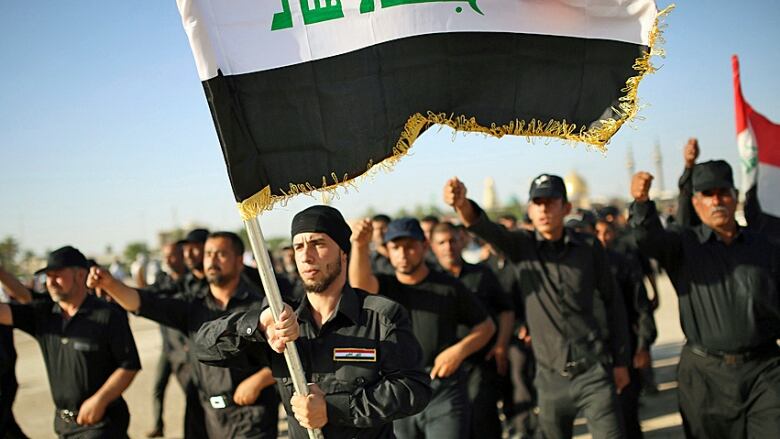ISIS militants just the latest spark to ignite Iraq's Muslim divide
Iraq's Kurds are also thinking hard about the future of the country, too

On a local Iraqi television network, a morning loop of reports about Da'esh — the Arabic equivalent of the acronym ISIS — detailed the horrors of the militant group's return to Iraq.
Each segment contained a litany of allegations: rape, destruction of heritage sites — especially churches — and wanton violence. Throughout, the ISIS jihadis were painted as outsiders.
The fact is, while many members of ISIS are indeed from other nations, the group was founded in Iraq, and many among its members, including its leader, are Iraqi. And Sunni Muslim.
But to describe their lightning rampage toward Baghdad as divisive would be an understatement.
ISIS's military adventure back into Iraq, after fighting in Syria for more than a year, and its ability to take and hold territory, has been bold and dangerous.
But its re-emergence — along with its gruesome new publicity tactics in video and on Twitter — have taken that danger to another level, threatening to tear this country apart from within.
Modern Iraq needs little help in being divided — it always has been. Those divisions of course were highlighted in the years following Saddam Hussein's fall.
Today, ISIS is both a symptom, and now a driver of that division.
It appears the group believes killing Shia Muslims is a duty. In its videos and literature, ISIS leaders call Shias renouncers and heretics.
In one grim video, a gunman boasts about killing a Shia moments after the man refused to hail the "Islamic state" as everlasting.
And now, just days after ISIS released photos apparently documenting the "liquidation" of hundreds of Iraqi soldiers — mostly Shia — Iraq's sectarian ghosts have been given new life.

In the course of a few hours on Tuesday, the bodies of several Sunni men were found, bullet riddled, in a largely Shia neighbourhood.
Dozens of Sunni prisoners were also killed, allegedly by forces loyal to the government, just outside of Baghdad, though there is some dispute exactly how they met their end.
ISIS militants had apparently been trying to free the prisoners, as they have done in several other cities, claiming to be righting the wrongs of an anti-Sunni Iraq government.
At least a dozen people were killed in the latest car bombing of the largely Shia neighbourhood of Sadr City — where hundreds, if not thousands — have died that way over the past several years at the hands of Sunni extremists.
In that morning newscast, an ad runs repeatedly featuring Iraq Prime Minister Nouri al-Maliki.
"Don't listen to those who speak of Sunni or Shia," he says. "Speak of Iraq."
It may be too late.
The Muslim divide
In 2006, a huge bomb went off at an important Shia shrine in Samarra, not far from Baghdad, marking what's widely acknowledged as the start of the post-U.S. invasion Iraqi civil war.
Within a few days, bodies showing the hallmarks of sectarian reprisals — execution style bullet wounds — were being dumped in the streets on both sides of the Muslim divide.
Back then, the hateful, dehumanizing language that had been ramping up in both Sunni and Shia communities reached an ugly, shockingly accepted refrain. No wonder the killing came so easily.
Today, you are starting to hear that kind of language again in Iraq. The talk about "the other."

Much of the blame for this is landing on al-Maliki's shoulders as he is accused of a stubborn inability to be more inclusive when it comes to Sunni Muslims in his government and its policies.
It might seem absurd, but that stance by al-Maliki has apparently made it more tolerable — for some, but by no means all, Sunni Muslims — to accept living under the draconian laws of ISIS, than one more day under al-Maliki's rule.
Whether that is really true or not isn't the issue. The issue is that more than a decade after the U.S. invasion—and despite the experience of that brutal civil war—Iraqis are as divided as ever, perennially using religion to define their sense of belonging.
It's making Kurds in Iraq think hard too. Their semi-autonomous northern region is all but separate from Iraq. Given how alienated they, too, feel, they don't have much faith in the current administration.
A colonel in the Kurdish Peshmerga security forces told me his personal choice was to separate, and simply move on.
But he did say there was time to salvage whatever is left of Iraq, and come together as Iraqis to defeat ISIS and its threat.

"Before we think about the military solutions we have to think about the political solutions," he said in an interview. "The problem, is there's no trust. That's the biggest problem in Iraq."
The country itself is also in question. The Kurdish prime minister said on Tuesday that "if we think that Iraq will go back, like, before Mosul, I don't think so. It's almost impossible."
Back in 2006, the sectarian hatred redrew the map of Baghdad completely — Sunni and Shia Muslims became physically separated.
This time, it's the entire country's borders that may be at stake.

